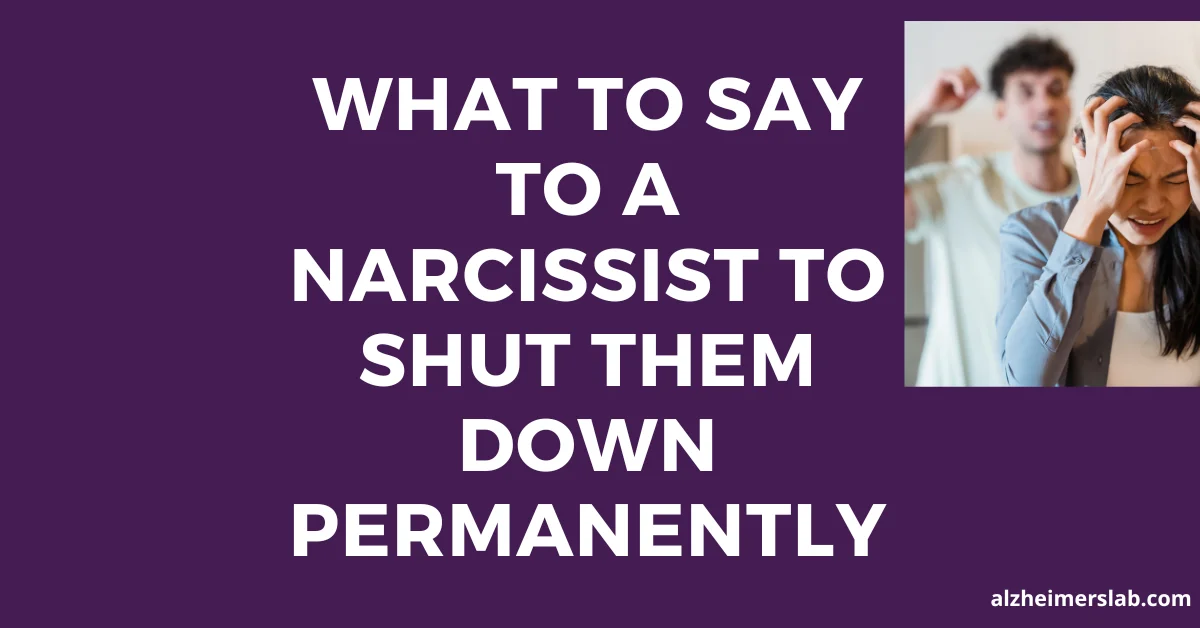What To Say To A Narcissist To Shut Them Down

Imagine yourself in a conversation, the words swirling around you like a disorienting fog. You feel unheard, your perspective minimized, and the other person seems to relentlessly steer the conversation back to themselves. The air crackles with unspoken tension, leaving you drained and questioning your own sanity. This scenario might be all too familiar if you've encountered a narcissist.
Navigating interactions with someone exhibiting narcissistic traits can feel like traversing a minefield. But there are strategies you can employ to disarm their tactics and protect your own emotional well-being. This article explores effective communication techniques to shut down a narcissist and regain control of the conversation, offering a path towards healthier interactions.
Understanding the Narcissistic Mindset
Before delving into specific phrases, it's crucial to understand the underlying motivations driving narcissistic behavior. Narcissism, at its core, is characterized by an inflated sense of self-importance, a deep need for excessive attention and admiration, troubled relationships, and a lack of empathy for others, according to the Mayo Clinic.
This doesn't necessarily mean the individual is intentionally malicious, but rather that their worldview is shaped by an intense need to validate their fragile ego. This need often manifests as a desire to dominate conversations, invalidate others' feelings, and maintain a position of superiority.
Strategies for Effective Communication
While it's impossible to diagnose someone without professional assessment, recognizing narcissistic traits can help you adapt your communication style. One powerful technique is to use the "Grey Rock Method." This involves becoming as unresponsive and uninteresting as possible.
Avoid engaging emotionally or providing them with the validation they crave. Keep your responses brief, neutral, and factual. For example, instead of arguing about whose version of events is correct, simply state, "That's one way to see it," and disengage from the debate.
Another effective tactic is to set clear boundaries. Boundaries are essential for protecting your emotional well-being. Be direct and assertive when stating your limits.
For instance, you might say, "I'm not comfortable discussing that," or "I need to end this conversation now." Enforcing these boundaries consistently is key, even if it provokes a negative reaction.
Refocusing the conversation is another strategy to regain control. When they attempt to steer the topic back to themselves, gently redirect it to a more neutral ground or something you both can agree on. This might involve saying, "That's interesting, but I was hoping we could discuss…" and then introducing a different subject.
Using "I" statements can also be surprisingly effective. Focus on expressing your feelings and needs without assigning blame. For example, instead of saying, "You're always interrupting me," try, "I feel unheard when I'm interrupted, and I need to be able to finish my thoughts."
The Importance of Self-Care
Dealing with a narcissist can be emotionally taxing, regardless of the strategies you employ. It’s important to prioritize self-care. Remember to validate your own feelings and needs. Engage in activities that bring you joy and relaxation.
Surround yourself with supportive friends and family who can offer a listening ear and a different perspective. If the relationship is significantly impacting your well-being, consider seeking professional guidance from a therapist or counselor. They can help you develop coping mechanisms and navigate the situation in a healthy way.
Ultimately, learning to navigate interactions with a narcissist is about protecting yourself and maintaining your emotional equilibrium. While you can't change their behavior, you can control how you respond. By implementing these communication strategies and prioritizing your own well-being, you can create a healthier and more balanced dynamic.


















